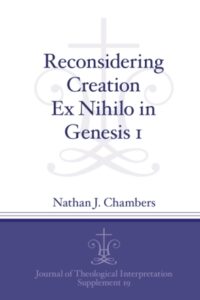 Jews and Christians often quote Genesis 1:1 in support of the belief that God created the universe out of nothing (Latin, ex nihilo). Biblical scholars, however, often challenge the use of Genesis 1:1 to support creation ex nihilo. Note how the following two English translations of Genesis 1:1-2a read very differently:
Jews and Christians often quote Genesis 1:1 in support of the belief that God created the universe out of nothing (Latin, ex nihilo). Biblical scholars, however, often challenge the use of Genesis 1:1 to support creation ex nihilo. Note how the following two English translations of Genesis 1:1-2a read very differently:
“In the beginning God created the heaven and the earth. And the earth was without form, and void. . .” (Gen. 1:1-2a KJV).
When God began to create heaven and earth—the earth being unformed and void. . .” (Gen. 1:1-2a TNK).
I have quoted the KJV and the TNK (the 1985 Tanak version of the Jewish Publication Society) because they use almost exactly the same vocabulary despite the structural differences in the translations. The traditional exegesis understands verse 1 as an independent statement, a complete sentence. Many other English versions reflect the same interpretation as the KJV (e.g., CSB, ESV, LEB, NASB, NET, NIV, NKJV, NLT, and others). Other versions reflect the exegesis that takes verse 1 as a dependent clause, with the main clause being verse 2 (“The earth was formless and void. . .”) or even verse 3 (“Then God said. . .”). Those taking verse 2 as the main clause include the GNT and the NRSV. Those that take verse 3 as the main clause include the TNK, quoted above, and the NABRE (a Catholic version).
The traditional interpretation is much older than the KJV. It is explicit in the Septuagint (the Greek version of the Old Testament originating a couple of centuries before Jesus). The ancient Latin versions reflect the same understanding. The exegesis of the Hebrew text that construes verse 1 as a dependent clause is a matter of ongoing dispute among Hebrew scholars.
The other issue that should be mentioned here is whether Genesis 1:1 is a statement of the initial act of bringing the universe into existence (the traditional view) or a summary of the whole creation account in Genesis 1:1–2:4 (a common view among many scholars today, including some evangelicals). The usual objection to the traditional view is that it implies that God created darkness and chaos (1:2). However, Genesis 1:2 does not describe chaos, but rather unformed and unfilled initial conditions. Isaiah 45:18 is often cited in this connection as supposedly denying that God created the conditions described in Genesis 1:2. Here is what Isaiah 45:18 says:
For thus says the LORD,
who created the heavens
(he is God!),
who formed the earth and made it
(he established it;
he did not create it empty,
he formed it to be inhabited!):
“I am the LORD, and there is no other.
(Isa. 45:18 ESV)
In context, the line “he did not create it empty” in Isaiah 45:18 does not mean that the conditions of formless and void preceded his creative work. Rather, the point is that God did not stop with a formless and void world but formed and filled it according to his purpose.
If we accept the traditional translation of Genesis 1:1 and the traditional interpretation that it expresses the initial act of creation by God, Genesis 1:1 looks very much to imply what theologians later called creation “out of nothing” (Latin, ex nihilo). This conclusion does not depend on the lexical claim that the verb “create” (bara’), in and of itself, denotes creation ex nihilo. That is clearly not the case, since Genesis goes on to say that God “created” the first human beings (1:27), and even that he did so using preexisting material (2:7). Rather, it is the use of bara’ in context that implies creation ex nihilo: God introduces something new, specifically “the heavens and the earth,” the totality of the physical world.
An excellent recent study that addresses these issues is Nathan J. Chambers, Reconsidering Creation Ex Nihilo in Genesis 1, Journal of Theological Interpretation Supplement 19 (Winona Lake, IN: Eisenbrauns, 2020). Chambers defends the traditional view of Genesis 1:1 as I have briefly summarized it here.